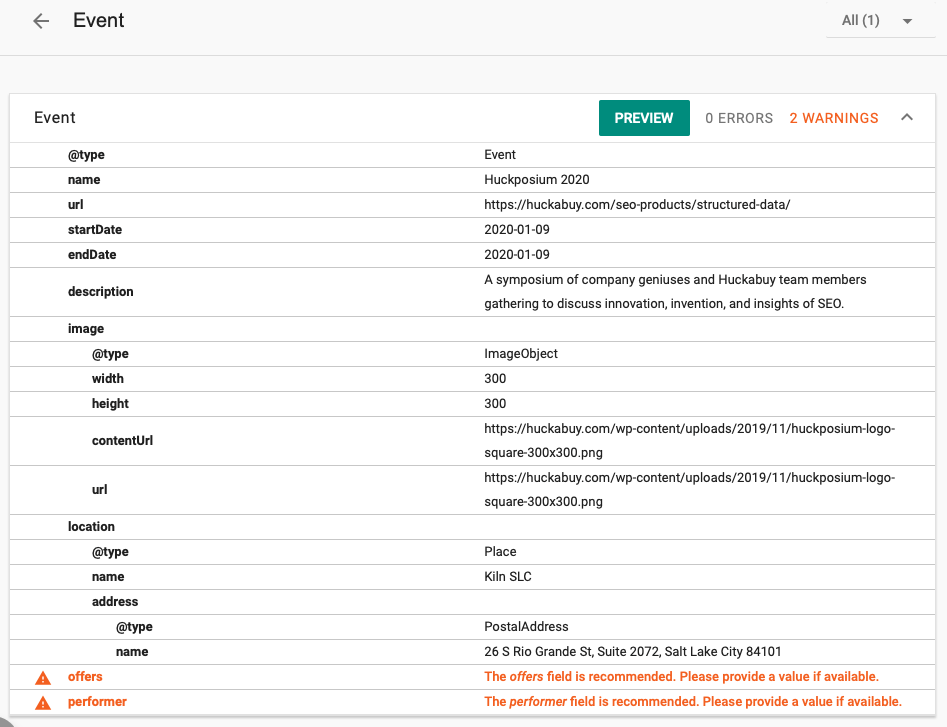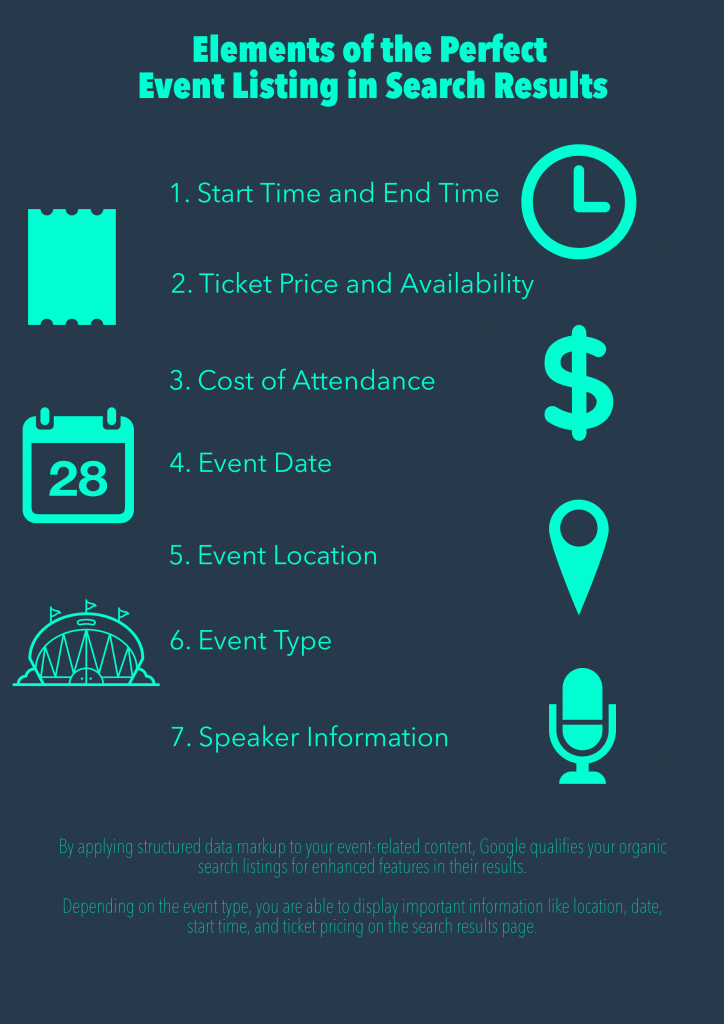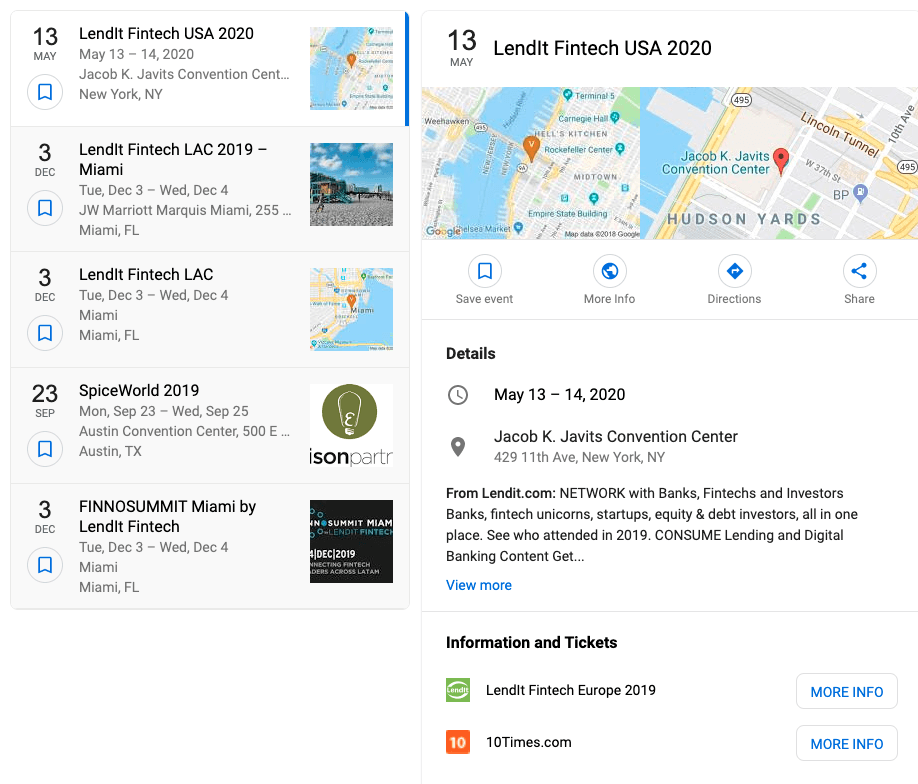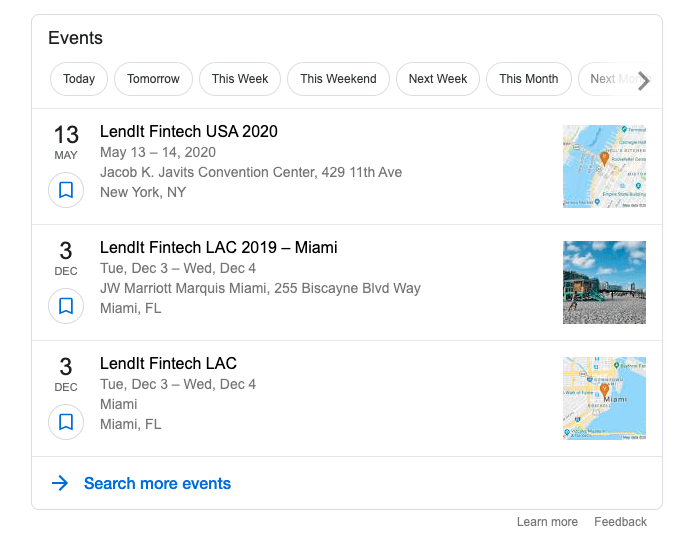Event Schema
Qualify event-related content for rich results in organic search
Qualify event-related content for rich results in organic search
Leveraging the organic search channel to promote anything from a concert to a conference, or even a retreat is one of the best ways to grow awareness, consideration, and sales for your event. One of the ways Google is helping event marketers increase each of these key performance metrics is by offering the opportunity to markup event-related content on their websites in order to qualify for rich results in search that display more information and features beyond the event link – including elements like ticket pricing, availability, imagery, speaker information, and location all on the search results page.
This is the future of SEO for events.
Event markup is incredibly powerful. If you think about any sort of ticket type company in today's age - movie tickets, music tickets, other show tickets - if they aren't utilizing this type of markup, they are missing out on a lot of potential organic traffic.
Think about the bottom line benefit of this markup strategy. As target customers are browsing the internet for a type of conference, for example, are they more likely to click on your result with more information on the page or are they more inclined to pick on a competitor’s result with just the standard blue link showing? The answer is clear. Customers will tend to click on the result displaying more information because it satisfies the query faster, it enables them to take action faster, and there is a sense of credibility and trustworthiness conveyed when Google is willing to prominently display this information among the organic results.
You can read Google’s documentation on event markup here.
Listed below are the following properties that need to be included in every piece of content utilizing event markup for SEO.
You can view the official documentation on event markup in schema.org here.
This is simply the title of your event.
This is an opportunity to clarify the dates and times of the event. Is it happening over the course of a single day? Multiple days?
Here you will need to disclose the purpose of the event.
Do you have a poster for the event that you advertise on billboards, walls, or elsewhere on the internet? Include that here.
Where will the event be hosted?
Are you selling tickets? A new product? Include those details here if applicable.
Does the event involve a band? A guest speaker? A number of different presentations? Include those details here if applicable.
If you have a piece of content that utilizes event schema, you can insert the URL into Google’s Structured Data Testing Tool to see whether everything is correct. The image below is a screenshot of the event markup on Huckabuy’s structured data product page for our annual “Huckposium” customer success event. You will see that we have included all of the properties necessary to qualify for this schema type, the markup is error-free, and Google has also included recommendations to provide information on offers and performers involved, if applicable.


LendIt, a prominent FinTech company, relies on Huckabuy’s automated structured data to populate event-based rich results for key elements of its business like the 2019 “LendIt FinTech Europe” Conference. Shown below are the rich results from the event schema populated on their site: the dates, location, ticket information, and map of the conference, among other elements, appear directly on the search results page.


A: Event schema is a class of structured data markup that informs Search Bots about all the important details on a webpage for events like concerts, conferences, sports games, and festivals. As a result of this markup type, customers discover and engage with event links in a more user-friendly fashion.
A: By communicating to Google everything it should know about your event or events, they can embed this important information directly in the search results page. If your business is competing with other events, attempting to drive more attendance, or looking to improve the customer experience for elements such as sign-ups or purchases, this is an excellent markup type to include in your website’s SEO strategy. Imagine yourself as the customer: are you more likely to engage with a standard blue link or one with additional features like location, pricing, and start date that help you satisfy your query or task faster?
A: Location, address, start date, end date, description, images, price, availability, currency, speaker, and performer are some of the recommended pieces of information you should include in the markup, depending on the event type.
A: Adding schema markup, also referred to as structured data markup, to your website is a time-consuming and resource-intensive project. If you are looking for a fully-automated solution, check out Huckabuy’s automated structured data software.